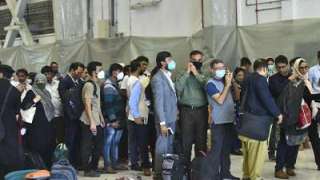MEDIA
Why India should engage the Taliban
www.deccanherald.in | August 27, 2021
Our national responsibility as a great power also extends to providing refuge to fleeing Afghans of all religious identities
Amid the US withdrawal from Afghanistan and the Taliban's capture of Kabul, the general atmosphere in India seems to be of pessimism vis-à-vis India's relationship with the new dispensation in our western neighbour. This pessimism is grounded in the history of India's non-existent ties to the Islamic Emirate of Afghanistan during the 1990s and several misconceptions about the Taliban, which I seek to dispel in this article.
I read the autobiography of Mullah Abdul Salam Zaeef, one of the founding members of the Taliban, in 2014, soon after I finished reading a sympathetic biography of my late grandfather, Vishnu Shahani. He was an Indian freedom fighter as well as a member of the Rashtriya Swayamsevak Sangh. What struck me was the similarities between the worldviews of my grandfather and Mullah Zaeef — their devoted love for their homeland and their conviction that religious nationalism would provide much-needed stability.
Mullah Zaeef was the ambassador of the Islamic Emirate of Afghanistan to Pakistan in 2001 when the Pakistani government, under US pressure, derecognised the Islamic Emirate and arrested Zaeef, who was sent to Guantanamo Bay. Zaeef expresses his anger at Pakistan, derisively referring to it as "Majbooristan, the land that is obliged to fulfil each of America's demands." This points to a common misperception in India of the Taliban as Pakistani proxies, a perception that denies the group's own agency, which was on display when the Pakistani government failed to bring the Taliban to the negotiating table during several rounds of talks of the Quadrilateral Coordination Group (Afghanistan, Pakistan, the United States and China). The fact that the Taliban were subsequently persuaded to participate in the talks in Doha without Pakistani mediation was a further indicator that Pakistan was unable to control the group. This is not to deny the likelihood of ties and financial support, but to underline the fact that the Afghan Taliban are an Afghan group with their own aims and diverse sources of funding, including taxation on poppy cultivation, narcotics processing and drug trafficking; taxes on other economic activities in Taliban-controlled areas; mining and extortion from mine operators; international Islamic charities; and other foreign governments such as allegedly, Iran and Russia. Hence, there are limits to how much influence Pakistan can exert over the group. This influence will wane further as Taliban members shift base to Afghanistan following the recent military victory.
Another common refrain I hear in India is that Pakistan is now at risk of a Taliban takeover. However, it is important to distinguish between the Afghan and the Pakistani Taliban. The Afghan Taliban are an Afghanistan-focused group with little interest in controlling Pakistan or any other country. The Pakistani Taliban, or Tehreek-e-Taliban Pakistan, are insurgents who target the Pakistani state but are alleged to receive funding from Indian and Afghan intelligence agencies (prior to the Taliban coup), so there is little chance that the Afghan Taliban will coordinate with the Pakistani Taliban to topple the Pakistani government. Nor are the Taliban likely to offer sanctuary to Daesh (commonly known as the Islamic State), who are bitter rivals whom the Taliban have aggressively targeted.
Although the Taliban hosted Osama bin Laden and Al Qaeda during the 1990s, Thomas Johnson and Chris Mason explain that this had much to do with Pashtunwali, the social and legal code of the Pashtun ethnic group which emphasises hospitality and forbids asking a guest to leave. Bin Laden himself was a product of the US and Saudi sponsored Afghan "jihad" of the 1980s, and former Taliban emir Mullah Mohammad Omar once compared bin Laden to "a bone in the throat that can neither be swallowed nor thrown out."
There is a legitimate concern that the Taliban rule will offer sanctuary for Kashmiri separatists to be trained. This underlines the need for India to engage with the Taliban and address serious human rights abuses in the Kashmir Valley and seek out a political resolution of the dispute over Jammu and Kashmir with Pakistan. Avinash Paliwal has argued that the 1990s Taliban were not necessarily averse to engaging with India.
While many videos have been circulating on social media and eliciting horror from Indian users, several of these have turned out to be false. It is incumbent upon us to use social media responsibly, refraining from sharing unverified information from dodgy sources. The media we share reaches Afghans in India, in Afghanistan and abroad and causes panic, so there is a need for sensitivity at the individual level. At a national level, too, we have a responsibility as an emerging Asian great power to seek dialogue to ensure regional stability. As Hashmat Ghani, the brother of deposed Afghan President Ashraf Ghani, puts it, "When you haven't been around certain kinds of people, appearances can be deceiving or even frightening." But there is a need to move beyond preconceived notions to make the best of a situation that was foreseeable for the past few years.
Our national responsibility as a great power also extends to providing refuge to fleeing Afghans of all religious identities, especially since democratic Afghanistan was one of our key regional allies. This is a way to build goodwill among the people of the region; India's arch-rival Pakistan has hosted millions of Afghan refugees for the past several decades.
(The writer is Assistant Professor, International Studies, at FLAME University, Pune)
Disclaimer: The views expressed above are the author's own. They do not necessarily reflect the views of DH.
(Source: https://www.deccanherald.com/opinion/why-india-should-engage-the-taliban-1024043.html)

